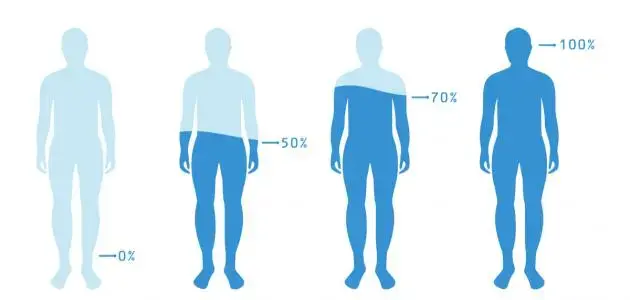Water is basically life. About 71% of the Earth’s surface is covered in it, and it makes up around 60% of our bodies. It’s even mentioned in the Quran in the verse: “And We made from water every living thing. Will they not then believe?”
It’s the best way to keep your body hydrated throughout the day—whether you’re sweating, peeing, or just breathing. Plus, water has no calories, caffeine, or alcohol, making it a super clean choice.
Why Your Body Needs Water
Every single cell and organ in your body needs water to work properly. Here’s a breakdown of why water is so essential:
Helps Control Calories
Drinking water instead of sugary drinks can cut down on your calorie intake. Plus, foods high in water content—like fruits and veggies—tend to fill you up more since they take longer to chew and digest.
Keeps Your Gut Happy
Water keeps things moving through your digestive system and helps prevent constipation. If you’re not drinking enough, your colon will pull water from your stool, making it harder to pass.
Supports Kidney Function
Water helps your body get rid of waste through urine. When you’re well-hydrated, your urine is light in color and odorless. If not, it becomes darker and smells stronger, because your kidneys are holding onto water for more essential functions.
Prevents Kidney Stones
If you’ve had kidney stones before, staying hydrated can help prevent them from coming back. Water dilutes minerals in the urine, which helps stop them from crystallizing into stones.
Boosts Muscle Performance
Water helps balance fluids and electrolytes in your muscles. If you’re dehydrated, your muscles can get tired faster and workouts feel harder.
Good for Your Skin
Your skin holds a lot of water and acts as a barrier to fluid loss. Drinking plenty of water can help keep it from getting dry and wrinkly.
Relieves Headaches
If you’re prone to headaches or migraines, staying hydrated might help ease the symptoms—especially if they’re caused by dehydration.
Maintains Fluid Balance
Water helps with a bunch of critical bodily functions, like:
- Regulating body temperature
- Delivering oxygen all over your body
- Protecting your brain, spinal cord, and organs
- Producing hormones and neurotransmitters
- Dissolving and carrying nutrients and minerals
- Aiding in digestion and circulation
- Creating saliva
- Keeping joints lubricated
How Much Water Do You Really Need?
Everyone’s water needs are different depending on factors like activity level and how much you sweat. While there’s no one-size-fits-all number, the U.S. National Academies of Sciences, Engineering, and Medicine recommends these daily intakes (including both drinks and food):
- Men: About 3.7 liters or 15.5 cups
- Women: About 2.7 liters or 11 cups
Keep in mind that about 20% of your daily water comes from food—like soups, fruits, and veggies (tomatoes, oranges, etc.). The remaining 80% comes from drinks. So if we’re talking just drinks, that looks like:
- Men: Around 12.5 cups a day
- Women: About 9 cups a day
What Happens When You Don’t Drink Enough?
Dehydration hits when you’re losing more water than you’re taking in—especially in hot weather, during intense exercise, or as you get older. Here are some of the side effects of not drinking enough:
- Higher blood pressure from thicker blood (remember, blood is 90% water!)
- Narrower airways, which can make asthma and allergies worse
- Drier, more wrinkle-prone skin
- Digestive issues like acid reflux or stomach ulcers
- Joint pain and less shock absorption in joints
- Brain fog—trouble with thinking, memory, focus, and low energy




